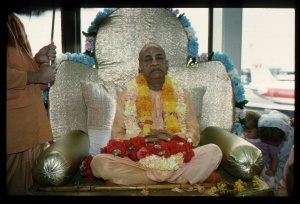CC Madhya 19.205: Difference between revisions
m (1 revision(s)) |
No edit summary |
||
| Line 1: | Line 1: | ||
{{ | [[Category:Sri Caitanya-caritamrta - Madhya-lila Chapter 19|C205]] | ||
<div style="float:left">'''[[Sri Caitanya-caritamrta|Śrī Caitanya-caritāmṛta]] - [[CC Madhya|Madhya-līlā]] - [[CC Madhya 19|Chapter 19: Lord Śrī Caitanya Mahāprabhu Instructs Śrīla Rūpa Gosvāmī]]'''</div> | |||
<div style="float:right">[[File:Go-previous.png|link=CC Madhya 19.204|Madhya-līlā 19.204]] '''[[CC Madhya 19.204|Madhya-līlā 19.204]] - [[CC Madhya 19.206|Madhya-līlā 19.206]]''' [[File:Go-next.png|link=CC Madhya 19.206|Madhya-līlā 19.206]]</div> | |||
{{CompareVersions|CC|Madhya 19.205|CC 1975|CC 1996}} | |||
{{RandomImage}} | |||
==== TEXT 205 ==== | ==== TEXT 205 ==== | ||
<div | <div class="verse"> | ||
taṁ matvātmajam avyaktaṁ | :taṁ matvātmajam avyaktaṁ | ||
martya-liṅgam adhokṣajam | :martya-liṅgam adhokṣajam | ||
gopikolūkhale dāmnā | :gopikolūkhale dāmnā | ||
babandha prākṛtaṁ yathā | :babandha prākṛtaṁ yathā | ||
</div> | </div> | ||
| Line 14: | Line 18: | ||
==== SYNONYMS ==== | ==== SYNONYMS ==== | ||
<div | <div class="synonyms"> | ||
''tam''—Him (Kṛṣṇa); ''matvā''—considering; ''ātmajam''—own son; ''avyaktam''—unmanifested; ''martya-liṅgam''—manifested as if perishable; ''adhokṣajam''—beyond the perception of the senses; ''gopikā''—mother Yaśodā; ''ulūkhale''—to the mortar; ''dāmnā''—with rope; ''babandha''—bound; ''prākṛtam''—an ordinary child; ''yathā''—like. | |||
</div> | </div> | ||
| Line 21: | Line 25: | ||
==== TRANSLATION ==== | ==== TRANSLATION ==== | ||
<div | <div class="translation"> | ||
“‘Although Kṛṣṇa is beyond sense perception and is unmanifest to human beings, He takes up the guise of a human being with a material body. Thus mother Yaśodā thought Him to be her son, and she bound Lord Kṛṣṇa with rope to a wooden mortar, as if He were an ordinary child.’ | “‘Although Kṛṣṇa is beyond sense perception and is unmanifest to human beings, He takes up the guise of a human being with a material body. Thus mother Yaśodā thought Him to be her son, and she bound Lord Kṛṣṇa with rope to a wooden mortar, as if He were an ordinary child.’ | ||
</div> | </div> | ||
| Line 28: | Line 32: | ||
==== PURPORT ==== | ==== PURPORT ==== | ||
<div | <div class="purport"> | ||
This verse from Śrīmad-Bhāgavatam ([[SB 10.9.14]]) is in reference to Lord Kṛṣṇa’s exhibiting Himself like an ordinary child before mother Yaśodā. He was playing like a naughty boy, stealing butter and breaking butter pots. Mother Yaśodā became disturbed and wanted to bind the Lord to a mortar used for pounding spices. In other words, she considered the Supreme Personality of Godhead an ordinary child. | This verse from [[Srimad-Bhagavatam|''Śrīmad-Bhāgavatam'']] ([[SB 10.9.13-14|SB 10.9.14]]) is in reference to Lord Kṛṣṇa’s exhibiting Himself like an ordinary child before mother Yaśodā. He was playing like a naughty boy, stealing butter and breaking butter pots. Mother Yaśodā became disturbed and wanted to bind the Lord to a mortar used for pounding spices. In other words, she considered the Supreme Personality of Godhead an ordinary child. | ||
</div> | </div> | ||
__NOTOC__ | |||
<div style="float:right; clear:both;">[[File:Go-previous.png|link=CC Madhya 19.204|Madhya-līlā 19.204]] '''[[CC Madhya 19.204|Madhya-līlā 19.204]] - [[CC Madhya 19.206|Madhya-līlā 19.206]]''' [[File:Go-next.png|link=CC Madhya 19.206|Madhya-līlā 19.206]]</div> | |||
__NOTOC__ | |||
__NOEDITSECTION__ | |||
Revision as of 03:19, 4 September 2021

A.C. Bhaktivedanta Swami Prabhupada
TEXT 205
- taṁ matvātmajam avyaktaṁ
- martya-liṅgam adhokṣajam
- gopikolūkhale dāmnā
- babandha prākṛtaṁ yathā
SYNONYMS
tam—Him (Kṛṣṇa); matvā—considering; ātmajam—own son; avyaktam—unmanifested; martya-liṅgam—manifested as if perishable; adhokṣajam—beyond the perception of the senses; gopikā—mother Yaśodā; ulūkhale—to the mortar; dāmnā—with rope; babandha—bound; prākṛtam—an ordinary child; yathā—like.
TRANSLATION
“‘Although Kṛṣṇa is beyond sense perception and is unmanifest to human beings, He takes up the guise of a human being with a material body. Thus mother Yaśodā thought Him to be her son, and she bound Lord Kṛṣṇa with rope to a wooden mortar, as if He were an ordinary child.’
PURPORT
This verse from Śrīmad-Bhāgavatam (SB 10.9.14) is in reference to Lord Kṛṣṇa’s exhibiting Himself like an ordinary child before mother Yaśodā. He was playing like a naughty boy, stealing butter and breaking butter pots. Mother Yaśodā became disturbed and wanted to bind the Lord to a mortar used for pounding spices. In other words, she considered the Supreme Personality of Godhead an ordinary child.